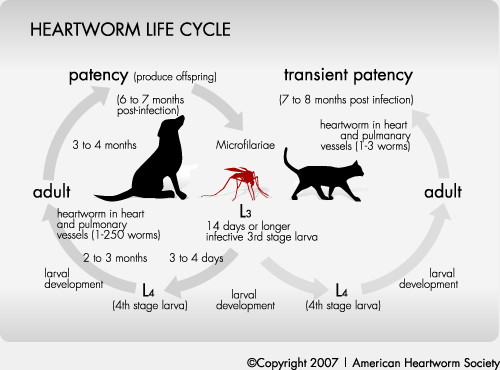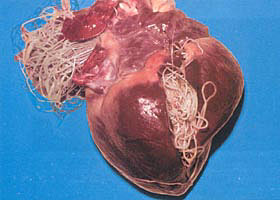Dog Care 101
Heartworms Can be Deadly
All pets can become infected with heartworms, even if they live mostly indoors. Breed, sex, and age does not affect susceptibility to heartworms, but dogs do get infected more often than cats.
Mosquitoes carry the parasite, transferring the infection when they bite. When a mosquito carrying the larvae bites an animal, the larvae are transmitted to the bloodstream and then mature in the heart, multiply by the hundreds, and can grow to 12-14 inches long.

Heartworms can live in an animal for up to 7 years. Though most cases of heartworms are treatable, the treatment is very risky (and requires the animal to be kept quiet in a crate for 8-12 weeks during treatment) and the disease can be fatal.

The treatment is also very costly compared to the cost of keeping your pet on monthly preventative. Keeping your pet on monthly preventative is considered a part of responsible pet guardianship, just as important as their annual vaccinations.
A monthly preventative is available from your veterinarian and it will also prevent infections from other types of intestinal parasites such as roundworms and hookworms, too. For more information on this deadly disease, please visit the American Heartworm Society website
A Guide to Dog Vaccinations
One of the most important things you can do to give your dog a long and healthy life is to ensure that he or she is vaccinated against common canine diseases.
Nursing puppies receive immunity from disease for the first few weeks of life by consuming disease-fighting antibodies through their mother. After that period it's up to you, with the help of your veterinarian, to provide that protection through vaccination.
Your veterinarian will recommend a vaccine program suitable for your dog. The type and frequency of vaccination will be based on your dog's age, lifestyle and the risk of exposure to infectious disease.
The following list is a typical canine vaccination program:
Puppies & Adult Dogs
- Canine distemper (“distemper”)
- Canine adenovirus-2 (“CAV-2”)
- Canine parainfluenza
- Canine parvovirus (“parvo”)
- Rabies
Additional vaccinations:
- Canine coronavirus
- Bordetella bronchiseptica
- Leptospirosis
Frequency:
Puppies should begin receiving vaccinations at six (6) weeks of age, or older, and should receive three (3) doses, three (3) to four (4) weeks apart. Vaccinations should occur annually thereafter, as determined by your veterinarian.
Avoid taking your new puppy to public places, such as pet stores and dog parks, until all rounds of puppy vaccinations are complete. Your puppy is still susceptible to contracting these diseases from other animals!
Vaccination is the key to protecting your dog against these diseases. Visit your local veterinarian to keep your dog’s vaccinations up-to-date, and for routine physical examinations that can help detect potential health problems early. These preventative measures will help assure the best quality of life for your canine companion – your friend for life!
For more information on vaccinations and canine diseases, talk to your veterinarian.
CANINE DISEASES AND SYMPTOMS
Canine distemper (distemper)
Canine distemper is a widespread, often fatal, viral disease. It is spread by discharges from the nose and eyes of infected dogs. Exposure during a dog’s lifetime is inevitable so this vaccination is almost always recommended. Symptoms include listlessness, fever, coughing, diarrhea and vomiting; convulsions and paralysis may occur in the disease’s final stages. The virus attacks many organs, including the nervous system, which may be permanently damaged if the dog does recover.
Rabies
Rabies is an incurable viral disease that affects the central nervous system of all mammals, including humans. It is spread through contact with the saliva of the infected animal through bites or any breaks in the skin. Once signs of Rabies appear, the disease is always fatal. For this reason many places require that all dogs — and cats — receive rabies vaccinations on a regular basis. Symptoms include lack of coordination and behavioral abnormalities such as unusual aggression or withdrawal.
Canine parvovirus (parvo)
Canine parvovirus is very contagious, debilitating and widespread. It is spread through infected feces and the highly resistant virus can remain in the environment for many years. Vaccination is the only certain method of preventing this potentially fatal disease, which is the most severe in young dogs. Symptoms include high fever, listlessness, vomiting and diarrhea.
Infectious Canine Hepatitis (ICH)
Infectious canine hepatitis (ICH), is caused by Canine adenovirus type 1 (CAV-1) and is transmitted among dogs by contact with secretions such as saliva, infected urine or feces. CAV-1 infects a wide range of tissues, including the liver, kidneys, spleen and lungs, and can live outside the host for weeks or months. Vaccination remains the best protection. CAV-1 can cause fever, bleeding of the gums and soft tissue and a loss of white blood cells that are a key component of the immune system. Death, chronic hepatitis or severe illness may occur. Recovery may be gradual in non-fatal cases. Symptoms of hepatitis are similar to the early stages of distemper and can cause liver failure, eye damage and breathing problems. The course of this disease can range from mild to fatal.
Canine Respiratory Disease
Infectious respiratory disease is easily transmitted in the air or by direct contact, especially in kennels or among dogs living together. Upper respiratory disease can limit the dog’s activity and can progress to pneumonia, which can be life threatening. The most common causes of respiratory infection in dogs includes Canine adenovirus type 2 (CAV-2), Canine parainfluenza and Bordetella bronchiseptica. CAV-2 is closely related to CAV-1 so the CAV-2 vaccine provides dual protection against both infectious Canine hepatitis and respiratory disease caused by CAV-2. Infectious tracheobronchitis (“kennel cough” or “canine cough”) is a persistent respiratory disease with a harsh, dry cough, often caused by viral infection complicated by Bordetella bronchiseptica.
Enteritis (Diarrhea, Vomiting)
Enteritis (intestinal disease) is caused by two common viruses, Canine parvovirus and Canine coronavirus. Canine parvovirus enteritis is generally considered more severe than coronavirus enteritis and it may be even more serious when both are present. Diarrhea and vomiting caused by these viruses can range from mild to severe and are accompanied by depression and a loss of appetite. Unvaccinated puppies and young dogs are most commonly affected because they usually have not been previously exposed or vaccinated and are susceptible to infection. Viral enteritis is easily spread because of the large volume of virus in feces, which contaminates the environment and is readily spread from one animal to another. Severe cases of viral enteritis can be fatal due to dehydration and loss of appetite. Puppies are at the greatest risk of death because of their limited body reserves.
Leptospirosis
Leptospirosis is a bacterial infection resulting from contact with infected wildlife, urine from infected dogs or contaminated water or food. The bacteria infects the kidneys and liver, causing fever, anorexia, depression and generalized pain. Several types of Leptospira bacteria can infect dogs. Your veterinarian can advise you on which types to vaccinate against.


Kansas K-9 ResQ is a 501 (c) 3 Organization


